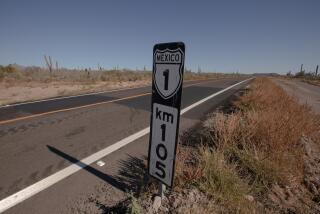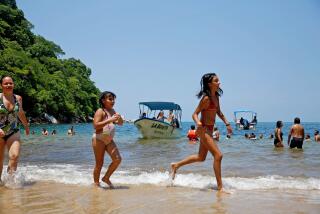China Tourism Still Off as Questions Remain
World Travel Watch is a monthly report designed to help you make informed judgments about travel throughout the world. Because conditions can change overnight, always make your own inquiries before you leave home. In the United States, contact the nearest passport agency office; abroad, check in with the nearest American embassy .
Asia
--China: Seven months after the Chinese government’s bloody repression of pro-democracy demonstrations in Tian An Men Square, tourism to China remains substantially reduced from expected levels and questions remain about the ethics of travel there. In some ways, now is a good time to go, with few visitors at the usually crowded tourist sites and the Chinese people eager to talk to foreigners. Then again, the nature of the political statement made by going should be considered.
Safety concerns were high in the aftermath of June 4, but now there is little need to worry. Compared to most Western countries, the crime rate is low and the military is keeping out of daily business, except in its continuing round-the-clock guard of Tian An Men Square. Future pro-democracy demonstrations cannot be ruled out, however, especially considering the sweeping changes in Eastern Europe that the Chinese government has addressed by dictating an official response and banning all gatherings, rallies and demonstrations in Tian An Men Square.
Air pollution is severe in China’s large cities, especially in the winter months when much coal is burned. Take precautions to avoid respiratory problems, and avoid drinking tap water throughout the country.
--Hong Kong: Legislators recently approved a plan to build a new airport on Lantau Island to replace busy Kai Tak on the Kowloon Peninsula. The plan includes extensive industrial and commercial facilities, and transportation links that make the complete project an enormous undertaking. The airport is scheduled for completion in 1997, shortly after the colony reverts to Chinese control. Kai Tak Airport is currently Asia’s second-busiest, after Tokyo’s Narita Airport.
Africa
--Gabon: The World Wildlife Fund is attempting to conserve a large tract of rain forest containing the world’s largest and last undisturbed forest elephant population. The forests of northeast Gabon, which have yet to be tapped for development, are also home to large populations of gorillas and chimpanzees, and at present have no formal protection. For more information, contact the World Wildlife Fund at (202) 293-4800.
--Libya: The U.S. ban on the use of American passports for travel to, in or through Libya has been extended another year, the result of continuing unsettled relations between the two countries. The ban was first imposed in 1981 and has been renewed each year since.
--Tanzania: There have been incidents of thieves posing as policemen, stopping foreigners and asking to see their currency declaration forms that indicate how much money they are carrying, then stealing the money. Don’t be taken in by such scams, and avoid street currency transactions because the risk of being swindled is high and police, in turn, occasionally pose as money changers to enforce currency regulations.
Europe
--East Germany: Travel restrictions have been eased here, allowing foreigners to obtain visas on arrival at the Leipzig airport if they are able to show a valid round-trip ticket and confirmed accommodations. Previously, travelers had to obtain a visa before arrival and needed to have a prepaid itinerary before being allowed to travel in East Germany.
South America
--Peru: The recent deaths of two backpacking travelers in an area of the Andes infested with Sendero Luminoso guerrillas emphasizes the need to heed warnings about travel in emergency zones. The young travelers from Australia and New Zealand were found on the road between Puquio and Abancay with a note indicating they were killed by the guerrillas, who are considered the world’s most vicious rebel group. Last May, a German couple was taken from a bus on the same road and killed. Emergency zones cover a third of the country. Avoid travel in these regions and check with the U.S. Embassy for current information.
--Venezuela: An outbreak of dengue fever has occurred in the north- central region of the country, with some cases being reported in Caracas. Most of the cases have been reported in the states of Aragua and Carabobo, and the government has begun spraying insecticide to control the mosquitoes that transmit the disease. Malaria cases have also increased, and have spread to the state of Lara, where the disease is not usually present. There is no preventive medical regimen for dengue fever.
Central America
--Honduras: Hotel accommodations in the capital of Tegucigalpa will be very limited until Jan. 15 because the city is hosting the Central American Games. Be sure to have confirmed accommodations before arrival.
North America
--Mexico: In an effort to reduce air pollution in Mexico City, a plan to restrict tourist auto traffic is in effect until March. Failure to comply will result in impoundment of the car and a fine of 300,000 pesos (about $115 U.S.). For vehicles with non-Mexican registration, the restriction is based on the last digit of the license plates. All cars may drive on Saturdays and Sundays, but cars with final digits of 5 or 6 can’t drive on Mondays; 7 or 8, no driving on Tuesdays; 3 or 4, no driving on Wednesdays; 1 or 2, no driving on Thursdays, and 9 or 0, no driving on Fridays.
Oceania
--Papua New Guinea: Violent crime continues to be a problem in both rural and urban areas. Avoid traveling alone in rural areas and book tours only with established agencies. Be careful in the cities, especially at night. A state of emergency is in effect in North Solomons province; non-essential travel should be avoided here. A state of emergency and a curfew are also in effect in Lae. Exercise caution.
Southeast Asia
--Philippines: The situation has stabilized following last month’s coup attempt by factions of the military, and life is essentially back to normal. Exercise caution, however, because future coup attempts cannot be ruled out. The Aquino government faces an uphill struggle to institute military reforms, uproot corruption and stimulate the economy enough to improve the plight of the poor.
The Philippine Mardi Gras--Ati-Atihan--takes place Jan. 21 in Kalibo, Aklan Province, on Panay Island, and is one of the country’s most celebrated holidays. Exercise caution, however, because in the last several months there has been an increase in street crime throughout the province, mostly robberies of foreigners.
For more information on safety concerns in countries you may be visiting, contact the Citizens Emergency Center, U.S. Department of State, Washington, D.C. 20520, (202) 647-5225 .
More to Read
Sign up for The Wild
We’ll help you find the best places to hike, bike and run, as well as the perfect silent spots for meditation and yoga.
You may occasionally receive promotional content from the Los Angeles Times.






